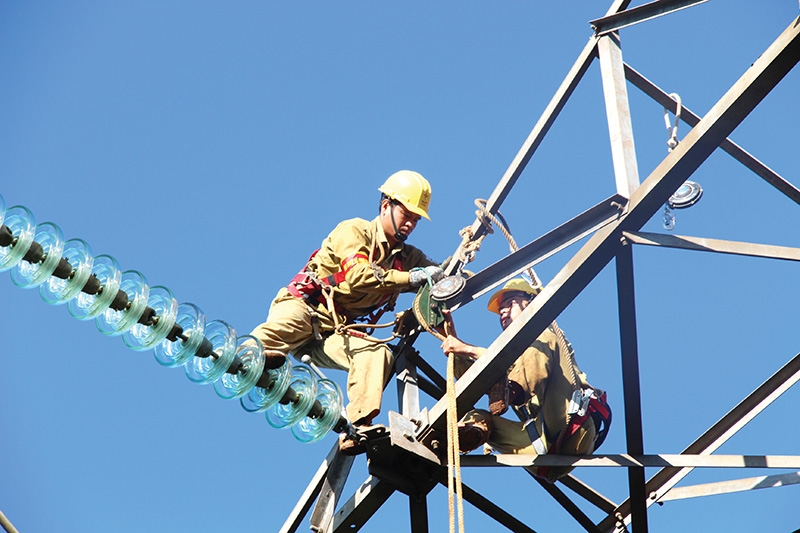Laying foundations for advancement
 |
| Infrastructure development is crucial to cash in on the prospects after the pandemic, Photo: Le Toan |
A survey from US-based market research and consulting firm Harris Polling conducted earlier this month revealed over 70 per cent of Americans think US firms should scale back their manufacturing in China. There have also been an increasing number of articles in publications such as The Economist and Foreign Policy, as well as comments from notable investors like Mark Mobius and from organisations like the Japan External Trade Organization (JETRO) and AT Kearney all predicting that Vietnam is set to benefit from an acceleration in the movement of manufacturing out of China.
The relocation or part-production shift is not a new movement as over the years enterprises have been looking to nudge a part of their supplier operations out of China to avoid increasing labour costs and trade disputes, but the coronavirus outbreak is likely to push the trend ahead. Survey respondents said that the Chinese market has always been very attractive, but added that they need a back-up plan.
Japan has been encouraging its companies to move from China, setting aside $2.23 billion of its pandemic stimulus package to help them move supply chains back to Japan or elsewhere.
US Secretary of State Mike Pompeo tweeted on April 29 that the US government is working with Australia, India, Japan, New Zealand, South Korea, and Vietnam to “move the global economy forward” and discuss how to restructure to shun supply chain disruption again in the coming time.
For these reasons, VinaCapital said that a wave of foreign direct investment (FDI) inflows is inevitable after the COVID-19 issue is resolved, which it said could be about one year from now. However, infrastructure and administrative procedures should be improved at a higher speed in Vietnam to reach new economic targets. “We believe Vietnam’s government should take whatever measures are entailed to seriously accelerate its infrastructure development programme because these projects can absorb large numbers of relatively low-skilled workers,” said Don lam, VinaCapital co-founder and CEO.
Virginia B. Foote from the American Chamber of Commerce (AmCham) said at last week’s video conference between the prime minister and businesses, “Another impetus for accelerating economic recovery is continuing infrastructure development and approving long-awaited investment projects. This is also an opportunity to focus on clean projects to improve waste management and recycling. Also, addressing air quality concerns in Vietnam can be accelerated by the use of clean energy, clean vehicles, clean agriculture, and reducing inefficiency and waste of energy.”
Disbursement of public funds has been low, due in part to Vietnam’s complex and often conflicting laws, resulting in a level of gridlock.
A recent JETRO survey shows that the localisation rate for parts production has tended to gradually improve since 2010, which was an achievement recorded by Vietnamese entrepreneurs’ efforts. The higher the localisation ratio, the fewer products are imported from overseas countries by Japanese manufacturers and assemblers, leading to reduced investment cost and making Vietnam more attractive in investors’ eyes.
Vietnam is one of the key destinations for enterprises to reduce risks of high wages. However, Hirai Shinji, chief representative of the JETRO in Ho Chi Minh City suggested that Vietnam should also improve infrastructure and cut administrative procedures.
Tran Si Chuong, economic consulting and business development strategy advisor, said that Vietnam is in need of huge investments in energy, transport infrastructure, telecommunications, and agriculture of up to trillions of US dollars for the upcoming decade. “We must promptly improve the investment environment so that large investors can be assured of long-term investment commitment, high technology transfer, and training a generation of highly-skilled professionals to help the country escape from the middle-income trap,” Chuong said.
All bottlenecks cannot be removed overnight, he added, but with a range of free trade agreements signed, Vietnam has the potential to lure more investment from electronic enterprises that would allow Vietnamese-made products to reap incentives when exporting. With creation of a new FDI strategy in the final drafting process, Vietnam is pinning its hopes on more high-quality FDI in the near future.
What the stars mean:
★ Poor ★ ★ Promising ★★★ Good ★★★★ Very good ★★★★★ Exceptional
Related Contents
Latest News
More News
- Foreign leaders extend congratulations to Party General Secretary To Lam (January 25, 2026 | 10:01)
- 14th National Party Congress wraps up with success (January 25, 2026 | 09:49)
- Congratulations from VFF Central Committee's int’l partners to 14th National Party Congress (January 25, 2026 | 09:46)
- 14th Party Central Committee unanimously elects To Lam as General Secretary (January 23, 2026 | 16:22)
- Worldwide congratulations underscore confidence in Vietnam’s 14th Party Congress (January 23, 2026 | 09:02)
- Political parties, organisations, int’l friends send congratulations to 14th National Party Congress (January 22, 2026 | 09:33)
- Press release on second working day of 14th National Party Congress (January 22, 2026 | 09:19)
- 14th National Party Congress: Japanese media highlight Vietnam’s growth targets (January 21, 2026 | 09:46)
- 14th National Party Congress: Driving force for Vietnam to continue renewal, innovation, breakthroughs (January 21, 2026 | 09:42)
- Vietnam remains spiritual support for progressive forces: Colombian party leader (January 21, 2026 | 08:00)

 Tag:
Tag:




















 Mobile Version
Mobile Version